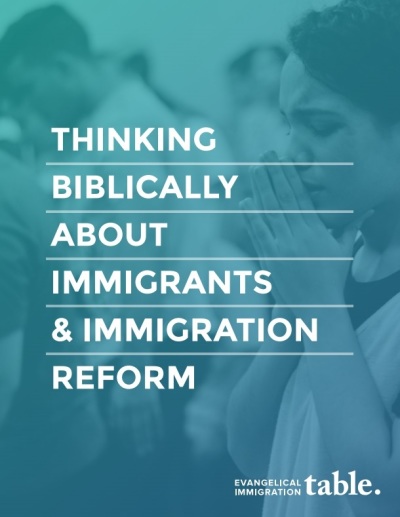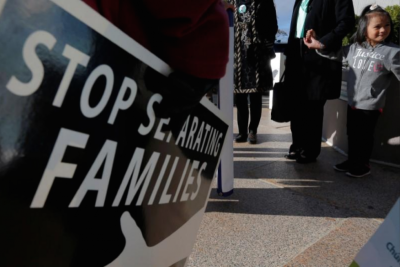Evangelical leaders call on Christians to take on 'biblical view' of immigration, love one's neighbor

The Evangelical Immigration Table is encouraging Christians to take on a “biblical view” of immigration by loving one's neighbor and supporting policy that allows undocumented immigrants to earn legal status.
Scripture does not necessarily prescribe “specific immigration policy” to govern any particular nation but the Bible is “replete with stories of immigrants, with specific instructions from God to the Israelites about how to treat the foreigners who came to reside in their land, and with broader principles that have clear ramifications for how contemporary followers of Jesus should interact with our immigrant neighbors,” EIT's newly released e-book, titled Thinking Biblically about Immigrants & Immigration Reform, says.
The book highlights God’s concern for the world’s most vulnerable and how some of the Bible’s most prominent characters were immigrants themselves. God’s people are told to love immigrants “as themselves” because “they knew firsthand what it is like to dwell in a land that was not their own.”
“When a stranger sojourns with you in your land, you shall not do him wrong,” the book quotes Leviticus. “You shall treat the stranger who sojourns with you as the native among you, and you shall love him as yourself, for you were strangers in the land of Egypt: I am the Lord your God.”
The 35-page e-book is endorsed by leaders of the eight organizations that head EIT, a broad coalition of evangelical organizations and leaders that advocate for immigration reform “consistent with biblical values.”
Those leaders include Russell Moore, president of the Southern Baptist Convention’s Ethics & Religious Liberty Commission; Samuel Rodriguez, an Assemblies of God pastor and head of the National Hispanic Christian Leadership Conference; retiring National Association of Evangelicals President Leith Anderson; Edgar Sandoval, president of the evangelical humanitarian agency World Vision U.S.; and Scott Arbeiter, who heads NAE’s humanitarian arm World Relief.
The book comes as a 2015 LifeWay Research poll found that just 12 percent of evangelicals cited the Bible as the primary influence of their opinions on immigration. Evangelicals were more likely to cite the media, local church and national Christian leaders as influencers in their immigration opinions.
Evangelicals in the U.S. are challenged to be guided by Scripture in their approach and thinking about the hot-button issue of immigration policy, one of many political issues dividing the nation.

“Though the Bible certainly includes principles that can help guide lawmakers, the Scriptures also speak to every follower of Jesus as they interact with their neighbors, some of whom are immigrants,” the book states.
“In fact, while applying biblical principles to public policy inherently requires some prudential determinations, biblical teachings about how to interact with immigrants themselves leave less space for differences of interpretation: We’re called to love our neighbors (Luke 10:27) and to make disciples of all nations (Matthew 28:19), regardless of where we land on public policy.”
The book outlines the six principles from the Evangelical Statement of Principles for Immigration Reform, which was drafted in 2012 and affirmed by thousands of pastors and other Christian leaders, that can be played out in the public policy context. It calls for a policy that “respects the God-given dignity of every person.”
The belief in “human dignity” should lead Christians to desire human life being protected. Playing out in the immigration context, Christians would “insist that our government provide a safe haven for refugees fleeing tyrannical governments or terrorist groups who are seeking to do them harm.”
“It’s a reason that U.S. asylum laws, which guide the government not to send someone back to a situation of danger, are so vital,” the book reads.
The EIT has long been critical of the Trump administration over its drastic cuts to the number of refugees being resettled to the United States. The evangelical leaders feel that the U.S. should be a place where people with a credible fear of persecution across the globe can come to seek refuge.
The Obama administration resettled nearly 85,000 refugees in the fiscal year 2016, Obama’s last full year in office. By comparison, just 22,491 refugees were resettled in the fiscal year 2018.
Belief in human dignity also calls on Christians to think about how they talk about illegal immigrants.
“Even referring to immigrants as ‘aliens,’ though that is the terminology used by many U.S. laws and by older English translations of the Bible, leads many contemporary speakers of English to conjure up ‘Hollywood-induced images of three-headed green Martians’ rather than human beings made in God’s image,” the book reads.
U.S. immigration policy should reflect the value of family unity, it argues, adding that government policies should “prioritize the strength and unity of families.”
Earlier this month, it was reported that President Donald Trump pushed to reinstate family separation policies for immigrants at the border. With polls showing that so many white evangelicals support Trump, the book wants readers to know that immigration policies should reflect family unity and seek to keep families together.
“If the family truly is the core building block of our society, all American policy, including immigration policy, should prioritize the strength and unity of families,” the book reads.

In seeking immigration reform, the book argues that it is key for the policy to “respect the rule of law,” suggesting that amnesty is not the appropriate response.
“Christians can and should understand the complex reasons that people have violated immigration laws, whether they did so by crossing the border without documents or overstaying a temporary visa. But we should not condone the violation of law, because this causes the law to lose its meaning."
A diverse range of Americans believes that current U.S. immigration policies are “in desperate need of reform," it adds.
The EIT advocates for the immigration system to be reformed in a way that will offer immigrants who came to the country illegally or overstayed a visa to be able to earn their way toward legal status. Deporting the millions of illegal immigrants in the U.S. would be too costly.
The earned legalization process would include the payment of a fine for all adults who willfully violated U.S. immigration laws. A criminal background check would be conducted and anyone convicted of a serious crime “ought to be deported.”
Immigrants would be allowed temporary legal status while they prove that they are working, paying taxes and not involved in criminal activity.
“If they meet all appropriate requirements, they’d eventually be able to apply to be lawful permanent residents of the United States,” the book reads. “Once they reach that status, they could choose to pursue the existing process for naturalization to become a U.S. citizen, which includes passing a test in English focused on the Constitution and U.S. history.”
According to the book, most undocumented immigrants in U.S. churches are “very eager to make things right, and they would be happy to pay a fine and meet other qualifications to eventually have the chance to be lawful permanent residents of the United States.”
The book recommends that investments should be made to better secure the U.S. border to prevent illegal immigration and trafficking. It calls on elected leaders to “take the challenge of border security seriously.”
At the same time, it contends that the government should also “respect U.S. laws that allow those with a credible fear of persecution to request asylum.”
The eight leaders of the EIT are also featured in a series of six videos released along with the e-book.
EIT has regularly issued statements of concern relating to the immigration issues.
Last year, EIT leaders suggested that the Trump administration’s refugee cuts could impact international religious freedom. The leaders asked the Trump administration to raise the refugee cap to 75,000 in the fiscal year 2019.
EIT leaders also spoke out last December against a proposed rule change from the Trump administration that would give the Department of Homeland Security more discretion in denying visas and green cards to immigrants deemed to be too reliant on public assistance. The leaders argued that such a rule would lead to a reduction in immigration to the U.S., especially for people applying on the basis of family ties.
The book is free to download and aims to become a resource to be used by churches, campus groups and other nonprofit purposes.
Follow Samuel Smith on Twitter: @IamSamSmith
or Facebook: SamuelSmithCP





















